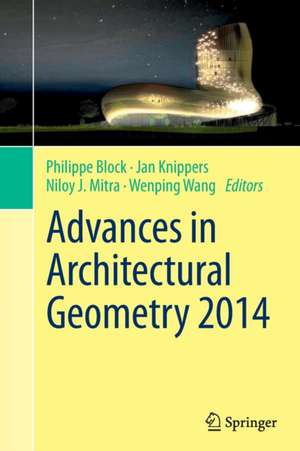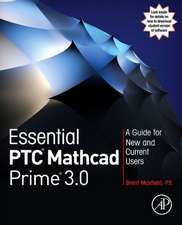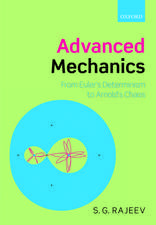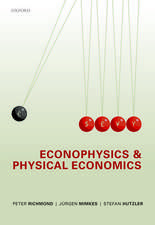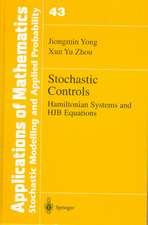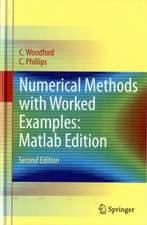Advances in Architectural Geometry 2014
Editat de Philippe Block, Jan Knippers, Niloy J. Mitra, Wenping Wangen Limba Engleză Paperback – 23 sep 2016
The book examines geometric aspects involved in architectural design, ranging from initial conception to final fabrication. It focuses on four key topics: applied geometry, architecture, computational design, and also practice in the form of case studies. In addition, the book also features algorithms, proposed implementation, experimental results, and illustrations.
Overall, the book presents both theoretical and practical work linked to new geometrical developments in architecture. It gathers the diverse components of the contemporary architectural tendencies that push the building envelope towards free form in order to respond to multiple current design challenges.
With its introduction of novel computational algorithms and tools, this book will prove an ideal resource to both newcomers to the field as well as advanced practitioners.
| Toate formatele și edițiile | Preț | Express |
|---|---|---|
| Paperback (1) | 949.23 lei 6-8 săpt. | |
| Springer International Publishing – 23 sep 2016 | 949.23 lei 6-8 săpt. | |
| Hardback (1) | 955.40 lei 6-8 săpt. | |
| Springer International Publishing – 13 ian 2015 | 955.40 lei 6-8 săpt. |
Preț: 949.23 lei
Preț vechi: 1157.60 lei
-18% Nou
Puncte Express: 1424
Preț estimativ în valută:
181.66€ • 187.66$ • 151.19£
181.66€ • 187.66$ • 151.19£
Carte tipărită la comandă
Livrare economică 25 martie-08 aprilie
Preluare comenzi: 021 569.72.76
Specificații
ISBN-13: 9783319352428
ISBN-10: 3319352423
Pagini: 394
Ilustrații: IX, 385 p. 334 illus., 135 illus. in color.
Dimensiuni: 155 x 235 x 21 mm
Greutate: 0.55 kg
Ediția:Softcover reprint of the original 1st ed. 2015
Editura: Springer International Publishing
Colecția Springer
Locul publicării:Cham, Switzerland
ISBN-10: 3319352423
Pagini: 394
Ilustrații: IX, 385 p. 334 illus., 135 illus. in color.
Dimensiuni: 155 x 235 x 21 mm
Greutate: 0.55 kg
Ediția:Softcover reprint of the original 1st ed. 2015
Editura: Springer International Publishing
Colecția Springer
Locul publicării:Cham, Switzerland
Cuprins
Simulation of Aggregate Structures in Architecture: Distinct-Element Modeling of Synthetic Non-Convex Granulates: K. Dierichs and A. Menges.- Post-Tensioned Discrete Concrete Elements Developed For Free-Form Construction: O.E. Pedersen, N.M. Larsen and D. Pigram.- Modular Fibrous Morphologies: Computational Design, Simulation and Fabrication of Differentiated Fibre Composite Building Components: S. Parascho, M. Dörstelmann, M. Prado, A. Menges and J. Knippers.- Application of Reinforced Structural Glass-Timber Elements in Architecture: Ph. Eversmann, P. Ehret, Ch. Louter and M. Santarsiero.- Gaudi’s Puffy Jacket: A Method for the Implementation of Fabric Slump Casting in the Construction of Thin-Shell Funicular Vault Structures: I. Maxwell and D. Pigram.- New Opportunities to Optimize Structural Designs in Metal by Using Additive Manufacturing: Salomé Galjaard, S. Hofman and S. Ren.- Interactive Modeling of Architectural Freeform Structures - Combining Geometry with Fabrication and Statics: C. Jiang, C. Tang, M. Tomicic, J. Wallner and H. Pottmann.- Computational Integration of Robotic Fabrication, Architectural Geometry and Structural Design for Biomimetic Lightweight Timber Plate Shells: O.D. Krieg, T. Schwinn, A. Menges, J.-M. Li, J. Knippers, A. Schmitt and V. Schwieger.- Form Finding of Twisted Interlaced Structures: a Hybrid Approach: S.S. Nabaei, O. Baverel and Y. Weinand.- A Graph-Based Approach for Discovery of Stable Deconstruction Sequences: L. Beyeler, J.-Ch. Bazin and E. Whiting.- Advanced Topology Optimization Methods for Conceptual Architectural Design: N. Aage, O. Amir, A. Clausen, L. Hadar, D. Maier and Asbjørn Søndergaard.- Computational Design and Construction of Notch-free Reciprocal Frame Structures: N. Mellado, P. Chi-Wing Fu, P. Song, X. Yan and N. Mitra.- Surface Panelization Using Periodic Conformal Maps.- T. Röhrig, S. Sechelmann, A. Kycia and M. Fleischmann.- Geometrical Solution Space for Grid Structure with Double-Walled Edge: R. Kalvo and A. Sevtsuk.- Designing Symmetric Derivatives of the Miura-ori: P. Sareh and S.D. Guest.- Algorithmic Optimization of the Cross-Section Distribution Across a Steel Framework Structure: L.Lombard, J. Lalande and F. Consigny.- Planar Panelisation with Extreme Repetition: M. Huard, M. Eigensatz and P. Bompas.- Interlocking Folded Plate - Integrated Mechanical Attachment for Structural Timber Panels: Ch. Robeller, A. Stitic, P. Mayencourt and Y. Weinand.- The Ongreening Pavilion: J. Harding, W. Pearson, H. Lewis and S. Melville.- The Caterpillar Gallery: Quadric Surface Theorems, Parametric Design and Digital Fabrication: R. Narvaez-Rodriguez, A. Martin-Pastor and M. Aguilar-Alejandre.- Constructing Complex Geometries: A Case Study on the Cité des Civilisations du Vin in Bordeaux, France: B. Soquier, R. Mizzi, D. Dureisseix and J.-B. Valette.- The Geometry of the Error: Y. Adilenidou.- LAR-ABC, a Representation of Architectural Geometry From Concept of Spaces, to Design of Building Fabric, to Construction Simulation: A. Paoluzzi, E. Marino and F. Spini.- Offset Folding: A. Stahr and H. Loeschke.
Textul de pe ultima copertă
This book contains 24 technical papers presented at the fourth edition of the Advances in Architectural Geometry conference, AAG 2014, held in London, England, September 2014. It offers engineers, mathematicians, designers, and contractors insight into the efficient design, analysis, and manufacture of complex shapes, which will help open up new horizons for architecture.
The book examines geometric aspects involved in architectural design, ranging from initial conception to final fabrication. It focuses on four key topics: applied geometry, architecture, computational design, and also practice in the form of case studies. In addition, the book also features algorithms, proposed implementation, experimental results, and illustrations.
Overall, the book presents both theoretical and practical work linked to new geometrical developments in architecture. It gathers the diverse components of the contemporary architectural tendencies that push the building envelope towards free form in order to respond to multiple current design challenges.
With its introduction of novel computational algorithms and tools, this book will prove an ideal resource to both newcomers to the field as well as advanced practitioners.
The book examines geometric aspects involved in architectural design, ranging from initial conception to final fabrication. It focuses on four key topics: applied geometry, architecture, computational design, and also practice in the form of case studies. In addition, the book also features algorithms, proposed implementation, experimental results, and illustrations.
Overall, the book presents both theoretical and practical work linked to new geometrical developments in architecture. It gathers the diverse components of the contemporary architectural tendencies that push the building envelope towards free form in order to respond to multiple current design challenges.
With its introduction of novel computational algorithms and tools, this book will prove an ideal resource to both newcomers to the field as well as advanced practitioners.
Caracteristici
Details recent advances in the emerging area of architectural geometry with a focus on the role of computation and geometry
Introduces novel computational algorithms and tools in architectural design
Reveals new design and fabrication possibilities to both newcomers to the field as well as advanced practitioners
Introduces novel computational algorithms and tools in architectural design
Reveals new design and fabrication possibilities to both newcomers to the field as well as advanced practitioners
